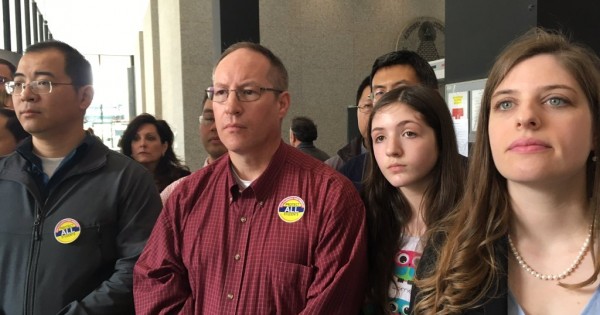Families involved in the lawsuit standby during Wednesday’s press conference.
Last year, Illinois’ District 211 fought hard to maintain discrimination against a transgender girl (identified only as “Student A”) who simply wanted access to the same facilities as other girls. Eventually, the district agreed to comply with the Department of Education’s mandate that the student be accommodated. Now, though, a group of conservative parents and students (and their conservative lawyers) have filed a federal suit to challenge those accommodations.
A group of 51 families (73 parents and 63 students — most of whom have maintained anonymity), represented by the Alliance Defending Freedom (ADF) and Thomas More Society, claim that allowing Student A access to locker rooms harms their kids’ rights by infringing on their privacy. The families even call themselves “Students and Parents for Privacy.” The way the suit reads, these students’ lives and educational experiences have been devastated by the stress of having to coexist with a transgender classmate.
The suit describes multiple forms of trauma these girls have apparently experienced knowing a transgender student might be in the restroom, including anxiety, fear, fright, apprehension, humiliation, intimidation, degradation, stress, embarrassment, discomfort, and loss of dignity.
But what this suit is really about is rejecting transgender people. These families claim they have a right to disregard who Student A is, and they claim that they are victims simply because she is going about her life. The complaint is long and detailed, which makes it easy to reveal these motivations.
An Identity Erased
The suit’s biases are evident from the very first page, where it denies Student A any legitimacy to her gender identity. It opens by identifying her as a “biologically male student who perceives himself [sic] to be female.” This notion that gender identity is merely a self-perception, as opposed to a core identity, is repeated throughout the complaint. Male pronouns and the term “biological male” are used to describe her throughout.
The bias against transgender people was further evident in a press conference the lawyers held announcing the suit on Wednesday. Jocelyn Floyd from the Thomas More Society explained, “We sympathize with children who have difficult personal issues to work through, but a young man [sic] shouldn’t be permitted to deal with those issues in intimate settings with a 14-year-old girl.” Floyd also demanded the government stop its “bullying tactics” of imposing a “dangerous social experiment” and “extreme political agenda” on schools.
The Bigots Are The Victims
District 211 previously refused to let Student A use the girls’ locker room, requiring her to use private changing rooms elsewhere in the school before phys ed class or other activities. What’s perhaps most ironic about the lawsuit is that it claims that those same alternatives are unacceptable accommodations for the girls in the suit. Rather than being ostracized for who they are, like Student A experienced, they claim to have been ostracized for their intolerance.
“Students who use the stalls are ridiculed and harassed by other students to such an extent that the stalls are not a practical option,” the complaint claims. It details how when one student used the private changing stall, “other girls who were in the locker room began calling her names, including ‘transphobic’ and ‘homophobic.’” When “word spread,” she was further “harassed by other students in the hallways.” The poor student now wears her gym clothes under other clothes to avoid changing for phys ed at all.
Other students in the suit simply haven’t bothered to ask for separate locker rooms or restrooms because the District has communicated that objections to sharing a locker room with someone transgender is “born of bigotry, ignorance, and a lack of education.” For that same reason, the students “are afraid to be named publicly in this lawsuit, for fear that other students and their schools will retaliate against them.”
But whether they asked for accommodations or not, the suit makes clear that no accommodation other than removing Student A from the girls’ facilities would suffice. There are gaps in the private stall, for example, so they might accidentally see through the cracks and unintentionally see Student A changing. And even if Student A used them, she would still have to walk through the locker room to get to them.
And these girls see Student A all the time. “One Girl Plaintiff saw Student A four times in one week in the restrooms,” the suit claims. “Other Girl Plaintiffs have experienced Student A staring at them in the restroom, which makes them uncomfortable.” They are now avoiding restrooms as much as possible “so they will not have to risk using the restroom with a male student present. This may increase their risk for various health conditions, like bladder infections.”
Even private restrooms, like the one in the nurse’s office, are insufficient. The complaint points out that it is too far away, so there is not enough time to use it and get to class on time. Besides, “this facility for changing is inferior to the locker room facilities provided for boy students.”
Avoiding Student A in the restrooms creates the same problem; “because there are only five minutes between classes, any student leaving one restroom to hunt for another is almost certain to be tardy.” The restrooms are so far apart that “there is not enough time for a Girl Plaintiff who is uncomfortable sharing a restroom with a biological male to leave the restroom she already walked into, walk to another restroom a distance away, attend to her personal needs, and then get to class on time.”
What’s ironic about these claims is that these are the exact same accommodations that were originally offered to Student A. Because they intentionally burdened and segregated her, the Department of Education rejected these required alternatives as not sufficiently meeting her needs. In fact, because transgender students are already vulnerable to bullying and ostracization, such segregation has a compounding effect that can result in severe consequences for their mental health.
The suit doesn’t try to offer any solutions for Student A — in fact, it doesn’t seem to care that she is accommodated at all — but it makes clear that the very alternatives to full equality that were supposedly good enough for her are insufficient for the other girls.
In doing so, these families are arguing that being transgender and being intolerant of transgender people as parallel experiences. They are explicitly demanding that the bigoted students’ sense of comfort take priority over the transgender student’s inclusion.
Transgender Inclusion = Sexual Harassment
But actually, the suit goes further. It insists not only that the girls are uncomfortable, but that simply allowing Student A access to girls’ facilities amounts to ongoing sexual harassment.
“The Locker Room Agreement and Restroom Policy create a hostile environment where Student Plaintiffs experience sexual harassment and loss of dignity at the hands of their school every day,” the suit claims.
Another section of the complaint asserts, “Allowing people to use restrooms or locker rooms that are designated for the opposite biological sex violates privacy and creates a sexually harassing hostile environment.” Furthermore, “Exposure to opposite-sex nudity creates a sexually harassing hostile environment.”
“It is the significant and real differences between the biological sexes that creates the hostile environment, which is harassment.” And that so-called harassment is “ongoing and continuous” because it occurs every time one of the girls uses any of the facilities.
In other words, Student A doesn’t even have to be in the bathrooms or locker rooms to make these girls feel like they’re being sexually harassed. It’s the mere possibility that she could enter that constitutes harassment — simply because she is transgender. Her mere existence in the school is “threatening and humiliating” and interrupts their opportunities for education.
The Real Motives
In between all of these claims of sexual harassment and violations of privacy are the real motives behind this lawsuit. It’s not a coincidence that the language rejects transgender identities; these parents explicitly admit that they want to impose their anti-transgender religious beliefs.
Here are a few excerpts from the complaint that spell out this intention:
Though the complaint does challenge the Department of Education’s trans-inclusive rules on procedural grounds and arguments about privacy, many of the legal claims are actually based on religious violations. The suit actually claims that the families’ religious freedom has been violated under the Illinois state Religious Freedom Restoration Act (RFRA), the federal RFRA, and the First Amendment’s guarantee of free exercise of religion.
The suit is basically an admission that these families wish to discriminate against transgender students for purely ideological reasons (“other religious doctrines”). Because of this supposed burden to their beliefs about modesty, the suit asks not only for an injunction of the policies, but for damages as well.
As Slate’s Mark Joseph Stern recently laid out, religious rejection of trans identities is at the root of most opposition to trans equality and inclusion. Claims about safety and privacy in the restroom are just a pretext, which is obvious because of the fact there has never been a single incident of trans people somehow taking advantage of nondiscrimination protections to harm anyone.
Just like anti-gay activists pivoted from religiously condemning homosexuality quite blatantly to instead using incomprehensible arguments about defending the institution of marriage, Stern argues that “anti-trans activists today are pulling a similar trick.”
“Their hostility toward trans people remains fundamentally religious,” he wrote. “The same Christian denominations that lined up against the validity of same-sex marriages have lined up against the validity of the trans identity.”
This lawsuit seems to be a perfect example of this facade is used. Though the talking points are about privacy, the cause of action is about religious beliefs. ADF, which regularly defends the “religious freedom” of religious conservatives, is constantly working to resist transgender protections, warning schools not to adopt inclusive policies and urging states to pass laws that discriminate against transgender people by promising to defend schools that follow such laws. It is no coincidence they are the lead attorneys on this case, along with the Thomas More Society, which is a Catholic law firm known for its anti-abortion and anti-gay legal work.
Edwin Yohnka, director of communications and public policy for the ACLU of Illinois, which has defended Student A, called the lawsuit “a sad development by groups opposed to fair and humane treatment of all students.” He noted that it is “only a small percentage of adults who insist on perpetuating these non-controversies by perpetuating ugly distortions about a vulnerable group of young people.”
According to Yohnka, ADF and the Thomas More Society merely “seek to stigmatize and ostracize those they dislike, ignoring both the facts and the law on the side of equality and justice.”
Source: thinkprogress.org




